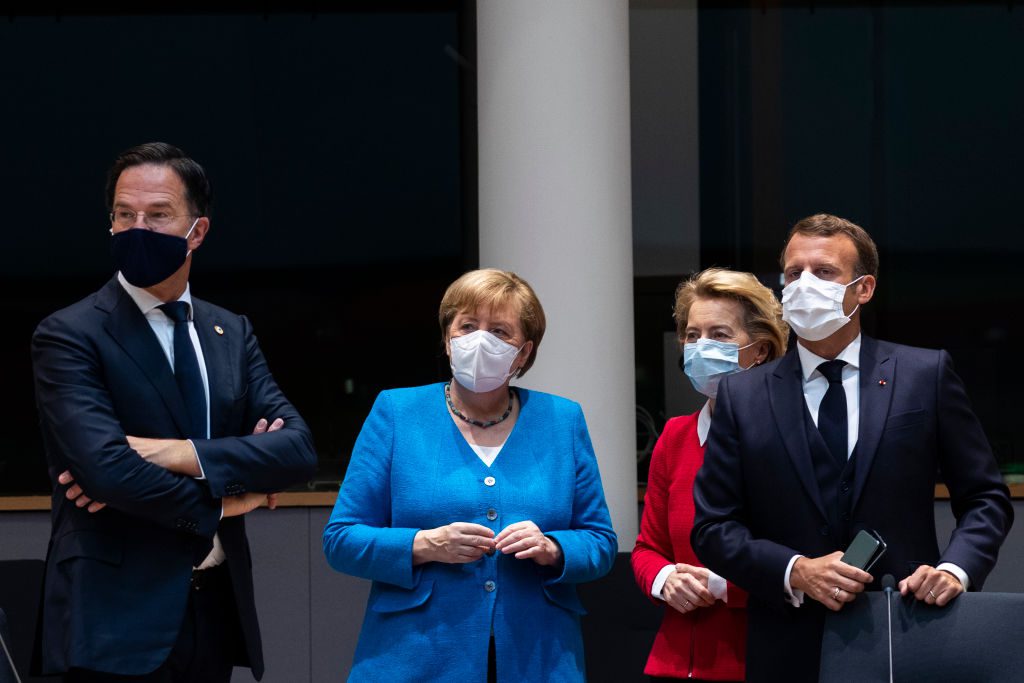Twilight of the European Nationalists?

Major developments this week for America’s legions of Dutch election watchers. Mark Rutte, the prime minister of the Netherlands, has won a fourth term. Rutte’s center-right People’s Party secured less than a quarter of the seats in parliament, but in the deeply fractured Dutch political system, that’s enough for a plurality. It’s also enough to form a government, provided Rutte is able to put together another coalition, which he almost certainly will.
Rutte is how American conservatives might imagine Paul Ryan at the deepest point in their nightmare REM cycles: wonkish, pragmatic, a fiscal hawk who makes deals with the left and rides a bike to work. His victory comes at the expense of a far Trumpier candidate, Geert Wilders, head of the Party for Freedom, which will return to parliament as the third-largest party. Wilders, with his sculpted dome of white hair and worries about immigration, has often been called the Dutch Trump or even Trump before Trump. And his dichotomy with Rutte hints at a broader truth: In Europe, right-wing nationalism has hit a snag.
It’s the technocrats who are in charge, at least for the moment.
This trend is most vividly illustrated in Italy, where a government that included the populist 5-Star Movement collapsed earlier this year. Out of its ashes emerged Mario Draghi, a new caretaker prime minister. Draghi is the kind of figure the 5-Stars once railed against, a former head of the European Central Bank and an ardent backer of the European Union.
Meanwhile, in France, Emmanuel Macron remains in power, a proud liberal who once compared himself to the god Jupiter. In Austria, the pragmatic center-right prime minister Sebastian Kurz chose last year to form a coalition with the Greens rather than ally again with the nationalist Freedom Party. In Germany, the centrist’s centrist Angela Merkel will soon cede power to Armin Laschet, a similar figure who promises a continuation of her policies. And while Merkel’s departure may very well damage her own center-right party, it’s unlikely that German populists will be the beneficiaries.
It’s a far cry from the Europe of five years ago, when Britain had just voted to leave the E.U., Marine Le Pen was rising in France, Wilders was setting off klaxons in the Netherlands, and the knives were out for Merkel over the migrant crisis. And in fairness, nationalism in Europe is hardly dead. The U.K. is still out, after all. Populists remain in charge of Hungary and Poland. Those populists are still apparently such a problem that the European Union is mulling for the seven millionth time how to “deal” with Hungary and Poland, as though those nations must be punished for democratically electing their own leaders. Even if populism isn’t presently wielding much power, its specter continues to haunt European elites.
There’s also the stubborn fact that certain nationalist issues remain popular, which has forced the technocrats to co-opt them in order to survive. Thus did Rutte during the 2017 Dutch election tack right on immigration, telling migrants to “behave normally, or go away.” Thus, too, has Emmanuel Macron lately been positioning himself as a culture warrior, painting France as deadlocked in a struggle between laïcité (secularism) and Islamic extremism. He also found time to call out “certain social science theories entirely imported from the United States,” repudiating what we would call woke cancel culture. (In fact, we imported postmodernism and deconstruction from France, but point well taken.)
So the forces that animated nationalism are still very real, even if the nationalists themselves have been left with their noses pressed against the glass.
What to make of all this? One takeaway is that nationalism is inherently disruptive to the established order, and while voters sometimes embrace disruption, they can just as easily react against it in favor of stability. This in particular explains the success of Rutte, who has never pretended to be anything other than a low-drama shepherd of the state. It also explains the persistence of Merkel, whose low-key knowhow has seen her through German fury over the refugee crisis and the COVID lockdowns.
And the coronavirus has only heightened that desire for a steady hand. Draghi rose to power in Italy precisely because even many of the right-wing populists acknowledged that 2021 was not a time for governmental dysfunction. Europe has been roiled by cultural tensions over COVID the same as the U.S. But as is also the case in America, underlying all that is a need for security, a sense that government is working and knows what it’s doing.
A final lesson is this: The European Union isn’t going anywhere. Rather than crashing into the next domino, Brexit has seen other member nations step back and take a deep breath. That isn’t to say Euroskepticism has dried up or that European leaders don’t sometimes use the E.U. as a foil. But even nationalist figures like Wilders have backed off their calls to leave the union entirely. The most imperial of supranational blobs can endure if there’s enough wariness over upending its status quo. So it is that we’re unlikely anytime soon to see a Frexit or Italexit or Nexit or Polexit (Czexit? Lichtenstexit?).
Still, as the pandemic fades, as a more regular-order politics returns, as poverty increases and inequality gapes, the appetite for populism could very quickly reassert itself. Expect next year’s French presidential election to be an early test, as Macron’s approval rating remains in the doldrums and Le Pen readies another outsider campaign.
Comments